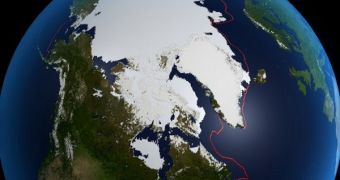A group of experts says that the first effects caused by the melting of Arctic ices are already beginning to show, after only three decades of decline. A species of single-celled alga, which went extinction in the northern Atlantic Ocean some 800,000 years ago, has now returned.
The microorganisms was not brought to the Atlantic by humans, but rather made its way from the Pacific Ocean, over the North Pole. Its movement was not hindered by the massive ice sheets that used to exist in the region.
While the introduction of the new alga species may not cause harm to the existing environment, it does herald other important changes that might sweep over the world's oceans, climate scientists explain.
This is the first trans-Arctic migration in modern times, and investigators behind the new study say that it's only a prelude to what might happen if the Arctic ice sheet continues to melt. The migration is a sign of the rapid change the ocean waters are experiencing.
The announcement was made by Sir Alister Hardy Foundation for Ocean Science professor of oceanography Chris Reid, who was the leader of the new research effort. He adds that it only took 30 years of global warming for high temperatures to carve a passage between the Atlantic and the Pacific.
In 30 more years, all summers are expected to be ice-free at the North Pole, a massive change that will have far-reaching consequences for both humans and other species that depend on the ices for their very survival. This change appears to be unstoppable.
The effects of climate change on marine environments are currently being centralized in a massive collaborative project called the Climate Change & European Marine Ecosystem Research (CLAMER).
The work seeks to synthesize the entirety of available data on the topic, providing whoever is interested with a wealth of information on how waters in the North Atlantic and around Europe will change.
“The major thing about this climate change is the rate at which things are happening at this moment. … We had change, we had warming, we had cooling, we had ice ages, but it was always slower than things are going now. The rate is unprecedented,” says researcher Katja Philippart.
The expert holds an appointment as a marine biologist with the Royal Netherlands Institute for Sea Research, and is also a coordinator for CLAMER, LiveScience reports.
In addition to global warming and climate change, factors such as pollution, habitat loss, water acidification and overfishing are also putting great stress on the waters, ecosystems, food webs and species, forcing them to adapt or go extinct. The latter is what usually happens.

 14 DAY TRIAL //
14 DAY TRIAL //